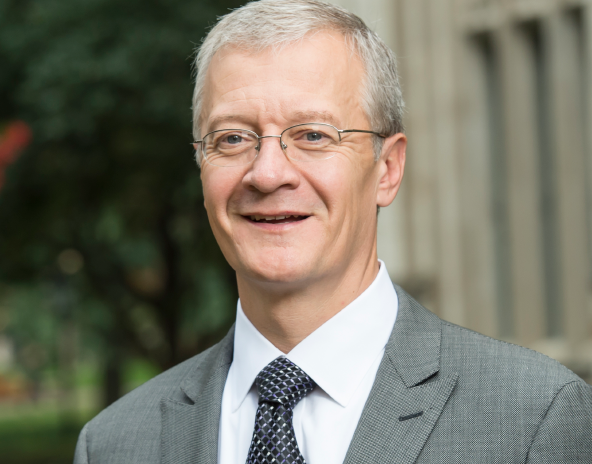Pitt task force planning fall on-campus operations amid pandemic

Via The University of Pittsburgh
David DeJong, the acting senior vice chancellor for business operations and vice chancellor for human resources, leads Pitt’s employee and operations task force.
May 19, 2020
Despite the ongoing COVID-19 pandemic, Pitt has continued campus operations wherever possible. Plans for an unclear fall semester operation continue to be under development through three task forces that are drafting proposals for fall operations.
Dave DeJong, the acting senior vice chancellor for business and operations and vice chancellor for human resources, has led the effort to plan campus operations and ensure that students, faculty and staff can feel safe as they return to campus.
“From the employee side, [we’re] making sure we’ve got the proper protective equipment available, that we’ve established protocols for behavior,” DeJong said. “[We’re also] providing education on behavior, both for people who are supervising as well as being supervised.”
DeJong is the chair of the employee and operations task force, which aims to determine how campus facilities can operate during the fall semester. This, he said, can include high-level requirements such as ensuring all nonremote employees have access to the proper personal protective equipment, as well as more fine-grained needs such as creating protocols for elevator capacity to ensure proper social distancing.
“Our specific part of that is to foster continuity of operations when it comes to our facilities, making sure that they are supporting the work we need to do given the heightened needs for safety and health,” DeJong said.
The task force is split into eight working groups, each focused on different aspects of faculty and facility operations. While DeJong is responsible for “communicating needs of the broader University efforts,” it is the job of the working groups to create plans for parking and transportation, the operation of dining facilities, workplace occupancy protocols and regional campus operations, among others.
“The University, I’ll steal some words from [Chancellor Patrick Gallagher], is kind of like a city,” DeJong said. “We’ve got so many different types of operations. The child care center is a good example. We run a child care center, and they’ve got an entire universe of issues that they need to worry about, which are very distinct from getting researchers back into a biomedical science tower.”
At the same time, two other task forces are examining other aspects of the University. One is formulating options on how to run Pitt schools for the upcoming academic year, and the other is drawing up recommendations on how to restart research.
With Gov. Tom Wolf’s recent decision to move Allegheny County to the yellow phase of reopening, DeJong said University officials were able to “relax their posture” and begin to restart research activities.
“Now, there’s a broader range of research that is permitted to take place, so we’re making sure that our buildings can handle that, and our employees know the right protocols, that capacity in labs is assessed so that we can safely determine how many people can be working together, all those sorts of considerations,” DeJong said.
DeJong said the task force’s work to reopen facilities such as research laboratories has allowed them to create similar safety plans for other University spaces.
“We are using the densification studies that we’re doing for labs, and extending that to dorms, to classrooms, and so on,” DeJong said. “Our facilities plans will cover living and instruction as well.”
According to Kevin Sheehy, the assistant vice chancellor for auxiliary operations and finance, creating alternative service plans for on-campus shuttle transportation services have been useful in understanding safety standards for a more densely populated campus. Sheehy works as the chair of the parking and transportation working group to ensure community members are able to navigate campus safely.
According to Sheehy, campus shuttles will now only be able to carry one third to half as many passengers as their full capacity. He said between 10 to 16 people will be allowed on 36-passenger buses, and five to 12 people will be allowed on 24-passenger buses.
Sheehy added that as part of the University’s recent decision to sign with a new shuttle contractor, Pittsburgh Transportation Group, new shuttle buses will circulate campus with more safety accommodations. These upgrades include hand sanitizers at the bus doors.
“The drivers will be wiping down high-touch areas such as the railings and those types of things,” Sheehy said. “Buses receive a very thorough, deep cleansing each night when they come off of their route and back to the hub.”
Joe Beaman, the director of dining services, said the same goes for dining facilities. As chair of the Dining Facilities: Return to Full Operation working group, Beaman’s job has been planning operations for dining facilities across campus — such as Market Central, The Perch, Forbes Street Market and Einstein Bros. Bagels — that allow customers to have on-campus dining options while maintaining safety.
Beaman said the University is working with incoming dining contractor Compass Group to launch new remote ordering alternatives for students, as well as additional to-go meal options.
Beaman said while it is Pitt’s intention to reopen all campus dining facilities, the working group is still in the early stages of planning and will likely not have final plans until early July.
DeJong echoed this, and said it is too early to tell what fall operation may look like for the majority of students, faculty and staff. While the situation is subject to change, he said community engagement is important to make sure the University community is prepared for whatever form fall operation may take.
“Given that situations can change, to ensure continuity, we need to be ready to handle those changes,” DeJong said. “It’s a really strong exercise that helps us ‘robustify’ our plans.”
Community members can submit feedback to the reopening task forces online.


